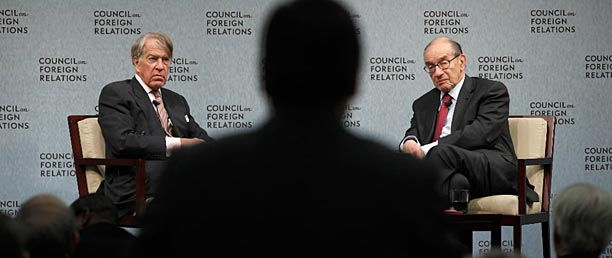March 22 at 8:47 a.m.
Filed under:
Economy,
Exchanges
By Reuters
Preventing another financial crisis similar to the one that shook the markets in 2008 requires a global effort and cannot be done by one nation alone, the head of the U.S. Commodity Futures Trading Commission said on Tuesday.
Gary Gensler, the chairman of the CFTC, the regulator of futures markets, said even though it is more than two years since the crisis exposed flaws in global financial and regulatory systems around the world, “significant uncertainty” still remains. Get the full story »
March 21 at 12:52 p.m.
Filed under:
Economy,
Government,
Mortgages
By Reuters
The U.S. Treasury Department will begin selling about $10 billion a month of mortgage-backed securities as the government winds down emergency programs set up during the financial crisis.
The announcement of a fresh supply of high-quality debt coming to market surprised traders, but they said later it should be manageable. The Treasury has a $142-billion portfolio of MBS, acquired in 2008 and 2009, and estimates it will take about a year to dispose if it. Get the full story »
March 21 at 12:41 p.m.
Filed under:
Economy,
Jobs/employment
By Reuters
The current high rate of unemployment in the United States is primarily due to cyclical factors, not structural changes in the economy, according to researchers at the San Francisco Federal Reserve Bank.
The study runs counter to worries among some top Fed policymakers that undesirable upward pressure on wages, and thus inflation, could kick in even when unemployment remains relatively high — a situation that could have implications for U.S. monetary policy. Get the full story »
March 18 at 6:16 a.m.
Filed under:
Banking,
Economy
By Associated Press
Inflation spooked the nation in the early 1980s. It surged and kept rising until it topped 13 percent. These days, inflation is much lower. Yet to many Americans, it feels worse now. And for a good reason: Their income has been even flatter than inflation.
Back in the ‘80’s, the money people made typically more than made up for high inflation. In 1981, banks would pay nearly 16 percent on a six-month CD. And workers typically got pay raises to match their higher living costs. No more. Get the full story »
March 17 at 11:39 a.m.
Filed under:
Economy,
International
By Reuters
President Barack Obama said during a meeting with Irish Prime Minister Enda Kenny on Thursday that the United States would help Ireland recover from its economic problems and that he would visit in May. Get the full story »
March 17 at 10:55 a.m.
Filed under:
Economy
By Associated Press

Wisconsin Gov. Scott Walker on March 11, 2011. (Reuters/Darren Hauck)
An Illinois company that makes items for trade shows is moving to Wisconsin.
Gov. Scott Walker announced Thursday that Catalyst Exhibits, Inc., will be moving from Crystal Lake, Ill., to Pleasant Prairie, Wis.
Walker says the company will employ 105 people and occupy a 144,000-square-foot facility. Walker says the company will invest $2.5 million in the state. Get the full story »
March 17 at 7:52 a.m.
Filed under:
Autos,
Economy
By Kathy Bergen
Midwest manufacturing continued its recovery in January, led by improvement in the auto industry, according to the Federal Reserve Bank of Chicago. The Chicago Fed’s monthly manufacturing index increased 1.1 percent in January, to a seasonally adjusted 84.1. Get the full story »
March 17 at 7:50 a.m.
Filed under:
Consumer news,
Economy
By CNN
Food and energy prices are surging. Still, underlying inflation remains low, the government said Thursday. The U.S. Consumer Price Index, a key measure of inflation, increased 2.1 percent during the past 12 months ending in February, up from 1.6 percent in January, the Bureau of Labor Statistics said Thursday. Get the full story »
March 16 at 5:17 p.m.
Filed under:
Economy
By Reuters
The yen soared to a record high against the dollar on Wednesday as concerns escalated over a nuclear crisis in Japan, and investors nervously watched to see if Japanese authorities will step in to stem the currency’s rise. Get the full story »
March 16 at 4:22 p.m.
Filed under:
Economy,
Investigations
By Reuters
Audit firms that failed to flag risks ahead of the financial crisis have not been held to account and an in-depth investigation is needed, an advisory group to the U.S. auditor watchdog agency said on Wednesday. Get the full story »
March 15 at 5:18 p.m.
Filed under:
Economy,
Food
By Reuters
A rising tide of global forces is supporting the surge in prices for important food staples such as meat, dairy and grains, commodity experts said at the Reuters Global Food and Agriculture Summit on Tuesday.
“This is a pretty sustainable increase. … A number of factors have been building over time in terms of the commodity increase: world economic growth, rising crude oil prices, increased Chinese import demand all have conspired,” said Bill Lapp, president of Advanced Economic Solutions, a commodity analytical firm based in Omaha, Neb. Get the full story »
March 15 at 1:27 p.m.
Filed under:
Banking,
Economy,
Government
By Associated Press
The Federal Reserve is sticking with its $600 billion Treasury bond-purchase program to strengthen the economy as Japan’s nuclear crisis raises worries around the globe. Get the full story »
March 15 at 12:23 p.m.
Filed under:
Economy,
Government
By CNN

Former Federal Reserve Bank Chairman Alan Greenspan, right, takes a question Tuesday morning about his recent publication, "Activism." (Chip Somodevilla/Getty)
Massive government intervention to save the economy is to blame for the lagging recovery, Former Federal Reserve Chairman Alan Greenspan said Tuesday..
“What we need to do now is to calm down; let things move by themselves,“ he said at a forum at the Council of Foreign Relations. “And indeed of rate of activism has decreased significantly and the ratio of capital flow has inched back up.” Get the full story »
March 15 at 8:47 a.m.
Filed under:
Economy,
Exchanges
By Reuters
U.S. stocks plunged at Tuesday’s open, with the Dow industrials sinking nearly 300 points within the first minutes of trading. The sharp sell-off follows an 11 percent drop in Japan’s leading index in the wake of a nuclear crisis caused by last week’s earthquake.
The Dow Jones industrial tumbled 216 points or 1.8 percent in the first two minutes of trading. The S&P 500 fell 25 points or 1.9 percent, and the Nasdaq dropped 70 points or 2.6 percent. Get the full story »
March 14 at 2:59 p.m.
Filed under:
Economy,
International
By Reuters
Japan’s devastating earthquake and tsunami may accelerate the point at which investors potentially lose confidence in the country’s finances, Moody’s Investors Service said on Monday. Get the full story »






